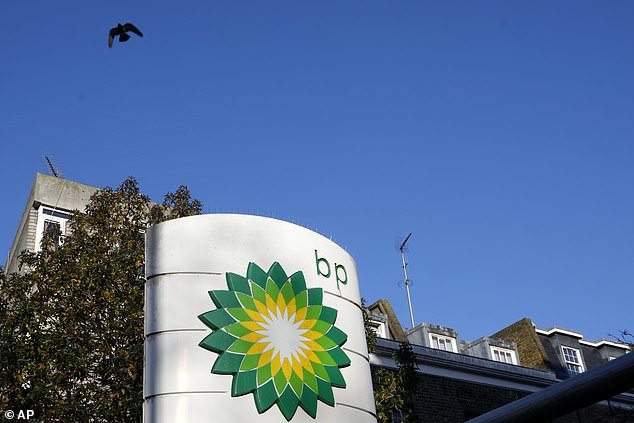- The oil supermajor forecasts net debts being around $4bn (£3.1bn) higher
BP expects its debts to swell and gas production levels to fall for the opening three months of 2025.
The oil supermajor forecasts net debts being around $4billion (£3.1billion) higher at the end of the first quarter, compared to the end of 2024, when it stood at $23billion.
The FTSE 100 company partly blamed the timing of payments related to bonuses and sales of low-carbon assets, as well as seasonal inventory effects.
It further anticipates upstream production will be lower, driven by declining gas and low carbon energy output due to recent divestments in Egypt and Trinidad & Tobago.
In the latter territory, the group sold four mature offshore gas fields and associated production facilities to Perenco T&T last December.
While BP expects oil output to grow slightly, it expects the gas marketing and trading result to be ‘weak’.

Forecast: Oil supermajor BP expects to report larger debts and falling gas production levels for the opening three months of 2025
And for its customers and products division, the business warned that trading would suffer from declining seasonal volumes, although refining margins will be stronger.
BP’s latest trading update comes a week after its chairman, Helge Lund, announced he would stand down amid longstanding criticism by investors. BP said Lund would ‘most likely’ leave during 2026.
Lund, 62, joined the firm in 2019, having spent time in charge at BG Group, Statoil – now renamed Equinor – and Norwegian engineering company Aker Solutions.
Under his leadership, BP’s share price has plunged by about a third following a failed push into green energy spearheaded by its former chief executive, Bernard Looney.
In late February, the business unveiled a dramatic shift in strategy, telling investors it planned to slash renewables funding by almost three-quarters per year.
By contrast, annual expenditure on oil and gas production would rise by about 20 per cent to $10billion (£7.9billion).
Before the announcement, BP had abandoned a goal to cut oil output, halted all new offshore wind projects, and scaled back its emissions targets.
However, the renewed focus on fossil fuels has failed to quell criticism from some shareholders, particularly activist investor Elliott Management, which has built a 5 per cent stake in BP.
In addition, oil prices have begun falling significantly in the past fortnight as President Donald Trump’s tariffs on imported US goods have rocked markets and heightened fears of a global recession.
Brent Crude now stands at $63.29 per barrel, compared to nearly $75 before Trump’s ‘Liberation Day’ speech on Wednesday last week.
BP shares were 1.65 per cent down at 335.95p on late Friday morning.
DIY INVESTING PLATFORMS

AJ Bell

AJ Bell
Easy investing and ready-made portfolios

Hargreaves Lansdown

Hargreaves Lansdown
Free fund dealing and investment ideas

interactive investor

interactive investor
Flat-fee investing from £4.99 per month

Saxo

Saxo
Get £200 back in trading fees
Trading 212
Trading 212
Free dealing and no account fee
Affiliate links: If you take out a product This is Money may earn a commission. These deals are chosen by our editorial team, as we think they are worth highlighting. This does not affect our editorial independence.
This article was originally published by a www.dailymail.co.uk . Read the Original article here. .

